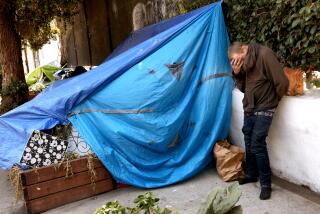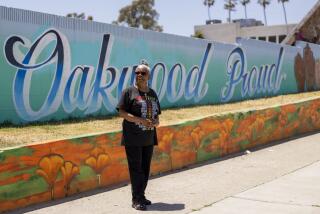Snapchat is trying to remake its image by giving back to its Venice neighbors
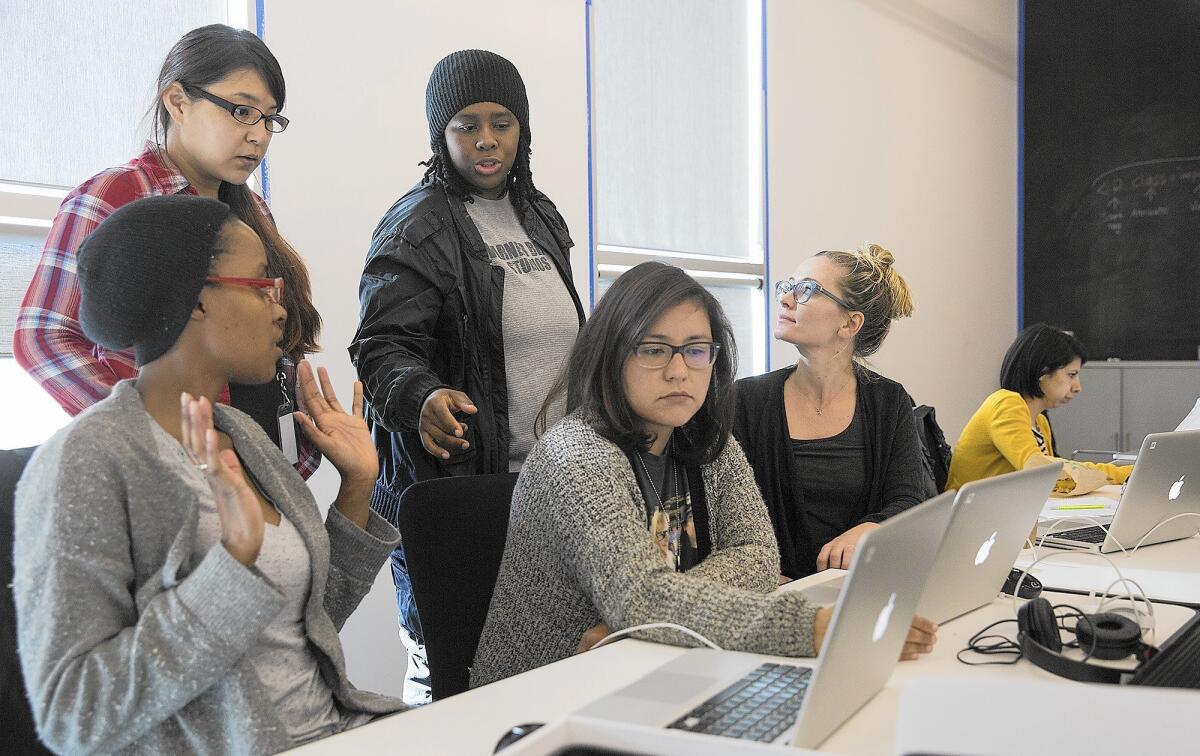
When St. Joseph Center, a homeless services agency in Venice, needed funding for a software programming class for low-income women, Snapchat Inc. was an obvious candidate.
But the neighborhood’s most-hyped start-up was better known for taking up land than giving back. So at a meeting last fall, St. Joseph Center started small, asking for a simple holiday drive before hinting at the need for a coding class sponsor.
Snapchat jumped at both ideas.
“We knew there was potential for you to see the good in it,” St. Joseph Center Executive Director Va Lecia Adams Kellum recently said, sitting alongside Snapchat spokeswoman Shannon Kelly. “We didn’t know you were going to love it.”
SIGN UP for the free California Inc. business newsletter >>
Many who live and work in Venice blame Snapchat for driving up rents, displacing locals and sanitizing an enclave whose trademark grit has given way to corporate shuttle vans, security guards and MacBook-toting millennials.
But to St. Joseph Center, Safe Place for Youth, Grand View Boulevard Elementary and other groups that have benefited from Snapchat’s largesse, the nearly 5-year-old company is a model for how Venice’s new tech residents can help preserve its character.
The groups said Snapchat over the last two years has sought to promote the arts among Venice youth and address entrenched issues of homelessness and income disparity.
This year, Snapchat plans to spend more than $500,000 on community service, not including donated employee time, according to a source not authorized to speak about the matter.
The company has not publicly discussed most of the initiatives, but the nonprofit groups and social services agencies hope Snapchat’s initial involvement will signal to hundreds of other beachside technology start-ups that they too can emphasize charity work early in their life cycles, a trend philanthropy experts say is emerging throughout the tech world.
“We live in one of the most beautiful places on Earth and everyone wants to be here,” said Alison Hurst, executive director of Safe Place for Youth in Venice, where Snapchat is paying for the construction of showers. “If you get to be in this awesome place, you have to give back.”
Giving back has not always been the tech industry’s strength. Demonstrators in the San Francisco Bay Area have blockaded employee buses and rallied outside offices — and even the homes of some tech workers — to protest the industry’s blasé response to its effect on the region. Tech leaders took heed. Facebook Chief Executive Mark Zuckerberg and Salesforce.com founder Marc Benioff joined others in pledging personal and professional donations.
Anti-tech sentiment has not reached the same tenor in Los Angeles. Nor, though, have charitable efforts by local tech companies.
Snapchat’s giving looks small compared with the millions of dollars offered up by older Silicon Valley peers. But Venice leaders say the disappearing-message app maker is at the philanthropic forefront.
That’s partially explained by Snapchat’s unusual real estate strategy, which has both ingrained the start-up into the community and alienated it. Companies of Snapchat’s size generally move to areas like Playa Vista, where large offices are more plentiful. Instead, Snapchat spreads 600 employees across a handful of office parks in Venice and Marina del Rey. Walking between buildings deepens employees’ desire to volunteer, they say — but it also turns the company into an easily spotted symbol of gentrification.
Snapchat, funded by $1.4 billion in venture capital and an estimated tens of millions of dollars in quarterly revenue from ads and in-app sales, declined to say whether it has set aside some of its stock for charitable causes. But Snapchat acknowledges there’s room to grow its philanthropy, and experts said that could happen if the company were to go public, as it hopes to do.
Snapchat says its philanthropy started in late 2013, when it had about 40 employees and received a $5,000 innovation award at retailer PacSun’s Common Threads industry event.
With the cash, Snapchat Chief Executive Evan Spiegel decided to encourage more of the creativity that lured him to Venice. Spiegel, 25, who declined to comment, told Los Angeles business leaders last fall that Venice’s creative vibe gave his team “the strength to defy conformity.”
To foster more of that creativity, the Pacific Palisades native chose P.S. Arts, a Venice nonprofit that brings arts education to schools.
Since that first small donation, Spiegel and other employees have volunteered in classrooms and at arts-and-crafts booths at P.S. Arts’ seasonal festivals. This school year, the bulk of the company’s close to $60,000 in donations is funding a visual arts teacher and a music teacher at Coeur d’Alene Avenue Elementary in Venice.
P.S. Arts put Snapchat in touch with Grand View in Mar Vista, where employees on recent weekends repainted basketball courts and installed volleyball nets. In May, volunteers plan to paint murals. Principal Alfredo Ortiz said the company was the first tech firm to volunteer there in his seven years.
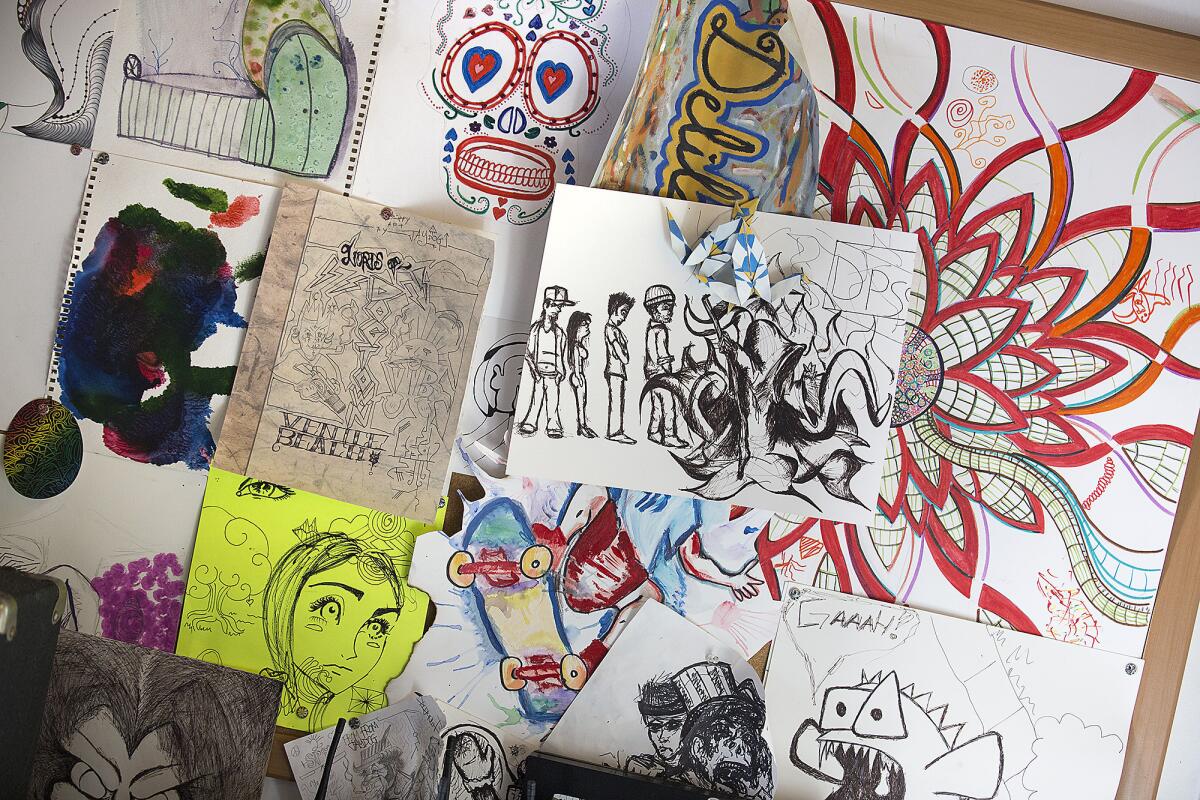
Artwork on a wall Safe Place for Youth on Lincoln Blvd. in Venice.
At Safe Place for Youth, Snapchat is building showers and paying for meals. Food is what attracts people to the nonprofit group, which aims to get 12-to-25-year-olds off the streets.
On a crisp January afternoon, five Snapchat employees spent an hour under a small tent scooping beans and meat from Plancha Tacos onto tortillas for about 45 teens. The scene repeats a couple of times each month.
Many companies help Safe Place for Youth, but Hurst said her clients relate well with “nerdy, techie Snapchat kids.”
For now, Snapchat’s biggest commitment is to St. Joseph Center, which said it received about $250,000 over the last year.
It began with a sock drive and 10 employees giving the center’s culinary-school kitchen its first deep cleanse in years. Then, the company bought gift cards and food for 300 people over the holidays — plus gifts from nearly every Snapchat employee.
Its most ambitious program is St. Joseph Center’s Codetalk — a triannual, 15-week course intended to provide women with unstable employment histories sufficient tech skills to land an entry-level job making websites. Students get to unpack a MacBook and keep it after the class.
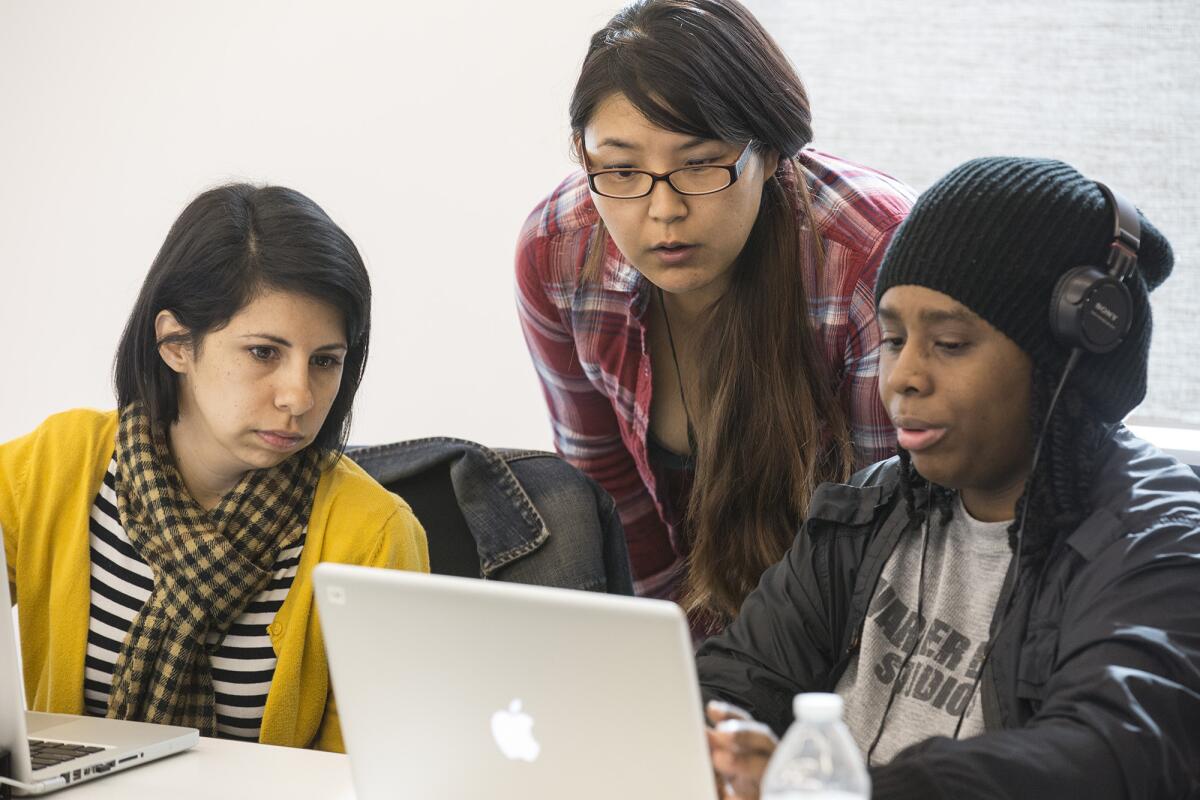
From left, Codetalk student Aimee Guzman, instructor Janice Lee, and student Erinn Bell during their web development class at the St. Joseph Center in Venice.
Snapchat is exploring volunteer opportunities in other cities where it has offices. Employees already tutor at a tech club for black and Latino boys near USC. But Venice remains the focus.
Some residents say Snapchat must do more to win them over. Michael Reese, 51, and his wife are frustrated that they have to park more than five blocks from home because Snapchat secured rights to an adjacent lot. The company’s “continued encroachment” is worrisome, he said.
The company has tried to ingratiate itself with neighbors, even in small ways like encouraging workers to use company-provided vouchers to lunch at local eateries, spending that adds up to tens of thousands of dollars each month, a source said.
But that doesn’t offset the tech-driven flight from Venice, Reese said.
“You have the original people who like it a little bit gritty but reasonable, and you have the new generation that wants to clean it up,” he said. “It’ll be interesting to see where the dust settles.”
Twitter: @peard33
MORE BUSINESS NEWS
The first lower-priced Whole Foods is coming to Los Angeles in May
Uber has 50,000 drivers with ties to the military, and it wants more
Harry Potter could make Universal Studios a real rival to Disneyland

